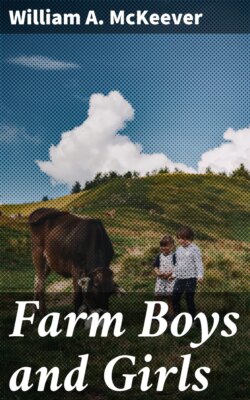Читать книгу Farm Boys and Girls - William A. McKeever - Страница 14
На сайте Литреса книга снята с продажи.
Moving to town for the children
ОглавлениеThe practice of the well-to-do farmer who moves to town to “educate his children” is an old story and is fraught with many a hidden tragedy, to say nothing of the impoverishment of the land and of the social order left behind. Why cannot the intelligent farmer remain on the home place and join a movement having for its purpose that of making the neighborhood a more desirable place of human habitation?
One of the dullest places in the world is the country town which has been filled up with retired farmers. These are usually men who came into the place for the purpose of getting all the possible advantages at the lowest possible cost. In the typical case the new city dweller of this class secures a very good residence, and that often, if possible, just outside the city limits, in order to avoid local taxes. He takes little or no interest in the town’s municipal affairs and votes against nearly all proposed improvements. He keeps his own cow, horse, chickens, and garden, and brings extra supplies in from the farm. Gradually he takes on a few of the city ways. That is, he uses less home produce and does some buying at the stores. But for want of stimulating employment he gradually grows stouter and mentally more stupid, sleeping away many of the hours of the day in his chair—an indication that he is dying at the top and that he is soon to be cut down. Really, the retired farmer is a nuisance to the town and the town is a bore to him.
But what of the children whom he brought in to “educate”? They learn rapidly, soon taking on the city manners. The natural restraints from evil conduct, which the farm home furnished, are now wanting. The blare and bluster of the town both excite and delight them, while the parents have positively no rules or standards by which to govern and direct their young in the new situation. All the boys and girls need to do in order to gain parental consent for going out at night is to declare that “everybody is going” or that they are “expected” to be there, and the thing is settled. Thus the young ruralists newly come to town go dancing and prancing off into a veritable world of sweet dreams and delights—spoiled forever for any service that they might have rendered in building up the country community—and finally destined to become mere cogs in the ever grinding wheel of some city.
